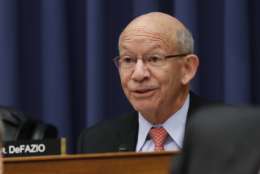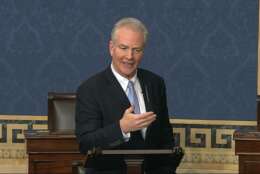Pay
-
Crazy question for the career federal workforce in this crazy year. Please consider it carefully. And the question is this: can you afford a pay raise this year?
November 16, 2020 -
Senate Republicans included a federal pay freeze for civilian employees in their 2021 appropriations bills. So where do things stand now?
November 16, 2020 -
Those who spent decades in the military will see a modest COLA increase as coronavirus pandemic continues.
November 12, 2020 -
Senate Republicans released the drafts of 12 appropriations bills Tuesday morning. One of the bills includes a federal pay freeze for civilian employees, senior executives and political appointees in 2021.
November 10, 2020 -
The Federal Salary Council is not recommending any new areas for 2022. But the council did engage in debate over the future of the federal locality program.
October 21, 2020 -
Federal News Network reviewed the track records and campaign policies for President Donald Trump and former Vice President Joe Biden. Here's where they stand on the issues important to federal employees, including pay, benefits and government oversight.
October 19, 2020 -
In today's Federal Newscast, two House Democrats are introducing their own legislation that would give retirees a higher cost-of-living adjustment next year.
October 19, 2020 -
The Trump administration will add Des Moines, Iowa, to its list of locality pay areas, bringing the total to 54. Adding a locality pay area will directly impact 3,100 federal employees, but the move could also have broader effects on the rest of the federal workforce, the Office of Personnel Management said.
October 14, 2020 -
The Senate is almost totally occupied with Amy Coney Barrett, President Trump's nominee to the Supreme Court, but this debate also crowds out other important business in a compressed time period.
October 13, 2020 -
Social Security recipients will get a modest 1.3% cost-of living-increase in 2021, but that might be small comfort amid worries about the coronavirus pandemic and its consequences for older people
October 13, 2020 -
Sen. Chris Van Hollen (D-Md.) has introduced new legislation that would make the president's payroll tax deferral optional for federal employees and servicemembers.
October 09, 2020 -
New proposed regulations from OPM reinterpret the agency's own 40-year-old reading of the Back Pay Act, and would limit the kinds of cases where federal employees could receive back pay, as well as exclude unions from receiving attorney fees.
October 07, 2020 -
If you could boost your take home pay 6.2% for the rest of the year but the tradeoff is that you’d have to repay it in a 12.4% bite from your paycheck starting early next year — would you take the deal?
October 07, 2020 -
A group of 43 House members, including four Republicans, are again calling on the Trump administration to give federal employees and military members the choice to opt-out of the president's payroll tax deferral.
October 05, 2020 -
In today's Federal Newscast, Congress makes another push to allow federal employees and military members to opt-out of the president's payroll tax deferral.
October 05, 2020














